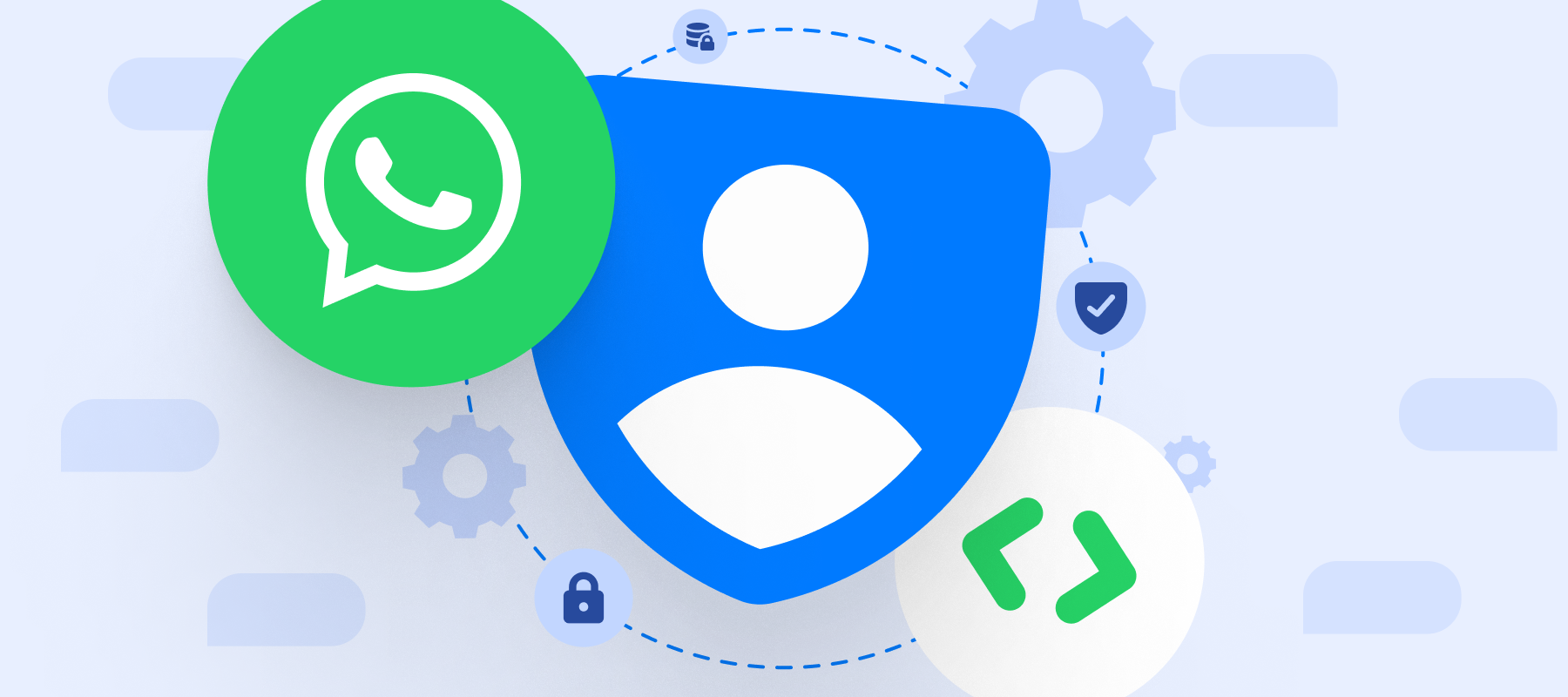Adopting WhatsApp for communication has become a common practice among businesses across industries. The platform has established itself as an effective and viable communication channel.
But with everything from marketing to sales, customer support, onboarding, etc. happening on the chat app itself, a large amount of data is exchanged on WhatsApp. In many cases, such as when sharing payment information, personal details, etc., this data can be sensitive, and if the business doesn’t secure this data, it can easily lose its reputation and customers.
In this post, we will talk about all that you need to know about data privacy while using WhatsApp Business API.
Understanding WhatsApp Business API data handling policies
Before we take a look at how we can ensure customer data privacy, let us take a look at and understand the various policies concerning WhatsApp Business API data handling:
End-to-end encryption
WhatsApp Business API ensures message privacy and accessibility only to the sender and recipient with end-to-end encryption. This prevents third parties, including WhatsApp itself, from accessing the content of the message. Encryption is crucial as it protects sensitive information from cyber threats and unauthorized access, thus ensuring secure communication.
Data storage and retention policies
Another one of WhatsApp’s security features that is a bit more subtle is its data storage and retention policy. WhatsApp does not store messages on their servers after they are delivered. This means that businesses are responsible for managing the storage of their data. This also reduces the risk of data breaches and by limiting unnecessary data retention ensures compliance with privacy regulations.
User consent and opt-in requirements
Explicit consent from customers before sending WhatsApp messages is compulsory for businesses. User consent can only be collected through authorized channels such as apps, websites, or customer interactions. This policy is crucial to prevent spam, align with GDPR, CCPA, and other compliance policies, and respect user preferences.
Compliance with local data protection laws
There are regional privacy policies or laws such as CCPA, GDPR, PDPB, etc. that businesses are required to comply with. These laws exist to govern how customer data is stored, collected, and used, thus forcing businesses to follow responsible data-handling practices and protect user rights. Noncompliance can lead to reputational damage, account restrictions, or legal issues such as heavy fines.
Prohibited content and messaging policies
WhatsApp enforces strict rules on business messaging, prohibiting spam, misleading information, hate speech, illegal content, and content promoting violence. Businesses are required to use pre-approved templates for notifications, which ensures appropriate, safe, responsible, and ethical communication.
Best practices for ensuring data security
Here are a few tips and best practices to follow for ensuring WhatsApp API data privacy:
Implement end-to-end encryption
To ensure secure messaging WhatsApp Business API’s end-to-end encryption is a crucial step to take. Implement end-to-end encryption on all messages to ensure that they remain private between the sender and receiver, preventing unauthorized interception, hacking, and third-party access.
Use secure channels to store customer data
Another best practice for WhatsApp customer data is to store customer data in secure, encrypted databases while avoiding retaining unnecessary information. To prevent unauthorized access only use cloud storage with strong access controls, two-factor authentication, and data encryption.
Have strong authentication methods
WhatsApp’s support of two-factor authentication is a great feature that can add an additional layer of security. Ensure that two-factor authentication is always enabled, along with strong passwords for team members who have access to the API.
Train agents
Neglect or lack of training among the internal team can also cause breaches. So, train your team members to handle usernames, passwords, and other important customer information, correctly and carefully. Your agents should also be educated on the importance of security and trained to recognize risks preemptively.
Monitor and block suspicious activity in real-time
Businesses should implement real-time monitoring systems to track and detect suspicious activity such as unusual message patterns, unauthorized access attempts, etc. By immediately acting and blocking such activity, businesses can prevent data breaches and ensure the safety of customer data.
Conduct regular security audits
To identify potential weaknesses or vulnerabilities and ensure protection from attackers, conduct regular security audits for your WhatsApp Business API. Besides this, regularly updating all the tools, systems, and software related to the API, is needed to stay protected from newer security threats.
Comply with data privacy laws/policies
Ensure compliance with data privacy and regulation policies of the regions you operate in. This means that if you are using WhatsApp to interact with international customers, you will have to comply with the communication and data protection laws of that region.
Compliance with GDPR and other regulations
To ensure compliance with GDPR and other regulations or privacy laws, there are a few things you can do:
Obtain clear and explicit consent
Before sending any messages, ensure that you have obtained clear, explicit consent from customers, to ensure that they are aware of how their data will be used and to avoid sharing unsolicited messages. Along with this, there should also be a simple opt-out system in place, in case users want to stop receiving messages from your brand.
Data minimization
Data minimization is one of the key principles of many regulatory laws like GDPR. Businesses should only collect the minimum amount of data from customers, which is necessary to fulfill a specific purpose and limit data retention to what is required.
Data processing agreements
If there are third-party service providers handling customer data via the WhatsApp Business API, businesses must establish clear data processing agreements, while informing customers about this. These contracts are necessary to ensure that all the parties comply with regulatory guidelines and follow proper practices for data protection.
Regular audits and reporting
Regularly auditing your data practices can help ensure compliance with GDPR and other regulations. Conduct periodic reviews and report these findings to identify and address gaps in compliance. This also helps maintain transparency and accountability in your data handling.
Data subject rights
Laws like GDPR provide individuals with several rights regarding their personal data, which include the right to access, the right to be forgotten, and the right to data portability. Hence businesses using the WhatsApp Business API for communication should have processes in place that allow customers to access, delete, or transfer their data on request.
Transparency in data handling
Businesses should be completely transparent about how they collect, store, and use customer data. Clearly conveying the privacy policies and data usage practices, updating these policies regularly, and making them accessible, are important not only to comply with regulatory laws but also to build trust with the customers.
Tools to help secure customer data
Below are some of the major tools that businesses can use to ensure data privacy while using WhatsApp Business API:
Compliance management platforms
Platforms such as TrustArc and OneTrust can help businesses manage and automate compliance with data privacy laws like GDPR, CCPA, etc. Alternatively, tools like Interakt can also help consistently meet compliance requirements and carry out ethical and responsible communication.
Identity management and access control
Measures like two-factor authentication and role-based access can help regulate who can view, access, or manage sensitive customer data.
Regular security auditing tools
Security audit tools such as Qualys, OpenVas, Intruder, etc. can be used to regularly audit WhatsApp Business API integrations to identify vulnerabilities in the system. This will help avoid issues, attacks, or leaks while maintaining security that meets the regulatory standards.
Encryption tools
As end-to-end encryption is essential to safeguard customer messages from unauthorized access, implement encryption tools that allow for securely transmitting messages. This level of protection prevents third parties from intercepting messages and reading sensitive customer data during communication.
Data loss prevention system
DLP or data loss prevention systems track the flow of sensitive customer data within your organization and help prevent accidental or unauthorized sharing, thus preventing breaches or leaks.
Conclusion
Data privacy should not in any way be of secondary importance for businesses, as customer privacy is at stake here. And the best way to ensure data privacy is to opt for an official WhatsApp Business API provider like Interakt, that can help you carry out secure and policy-compliant communication.






